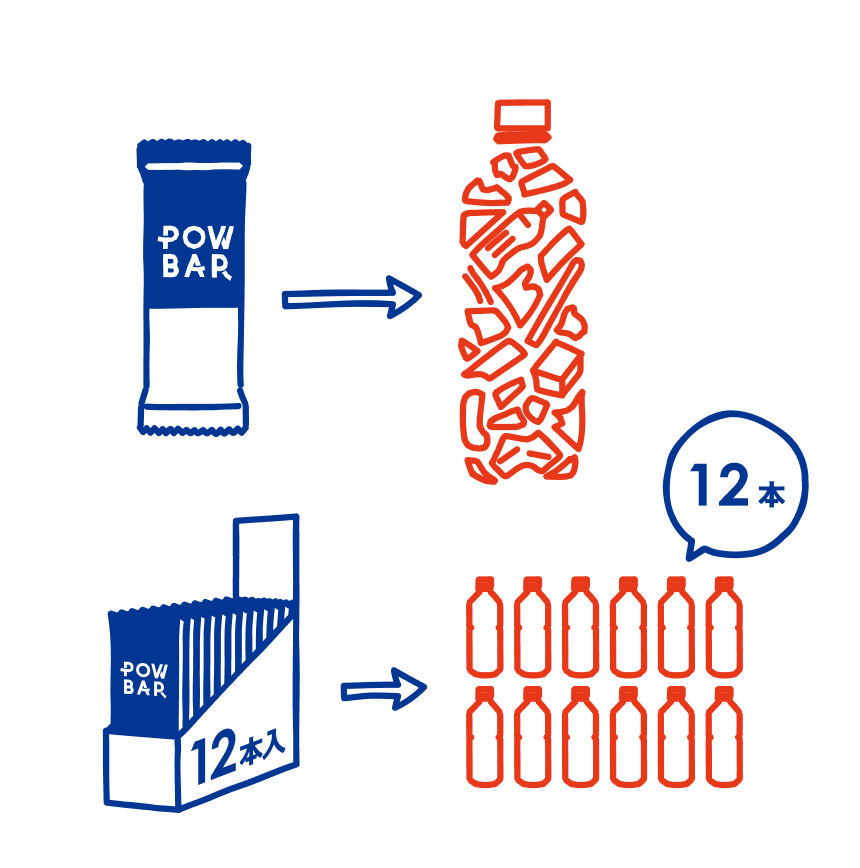
When you eat one POW BAR, the amount of waste plastic* equivalent to one plastic bottle is collected from the environment.
*1 Bar / 1.6g x 11.25=18g, approximately the equivalent of one 500ml plastic bottle (Source: rePurpose Global)

Our energy bars are packaged in plastic.
We are constantly looking for more environmentally friendly packaging materials, but for a variety of reasons we have not yet found a satisfactory alternative.
However, environmental pollution caused by waste plastic is becoming more serious and is already having a negative impact on the Earth's ecosystem and our lives.
What can we do now?
The POW BAR Co. donates a portion of its sales to rePurpose Global efforts.
[Plastic Negative Certification]
Plastic negative is a concept that involves recovering and reducing more plastic than we use and emit. POW BAR supports efforts to recover and recycle 11.25 times the amount* of plastic used in each energy bar during production.
rePurpose Global, which issues the certification system, is a platform that promotes plastic negativity on a global scale. It provides "Plastic Negative Certification/Plastic Neutral Certification" to companies that measure and offset the plastic footprint of individuals and companies and have plans for future reduction, and supports innovators who work to reduce waste, regenerate lives, and restore the natural balance.
How POW BAR Plastic Negatives Work
-

The amount of plastic used in the production process of one POW BAR is calculated, and a donation amount is determined based on the amount of waste plastic collected.
-

A portion of POW BAR's sales is donated to an innovator in Goa, India, who collects waste plastic from beaches and other areas and uses it to manage and improve infrastructure.
-

The collected waste plastic is not incinerated or landfilled, but is sorted by type and processed into reusable items or used as environmentally friendly fuel.
-

Purchasing one POW BAR helps to recover from nature 11.25 times the amount of waste plastic (about the equivalent of one PET bottle) used in its production process.
FAQ
Plastic Negative is a company that goes beyond the scope of its own business to tackle environmental issues on a global scale.
Collapsible content
Why do you contribute to local communities in other countries instead of Japan, where your products are manufactured and sold?
In order to recycle dirty or contaminated plastic waste, it needs to be separated and washed. However, in developed countries, including Japan, it is exported to Asian countries under the pretext of "resources." Most of the countries that are sources of marine plastic are in East and Southeast Asia, and many of them also contain plastic waste from developed countries. Although the number has decreased since the Basel Convention came into effect in 2021, many receiving countries do not have sufficient infrastructure for waste disposal and are unable to prevent environmental pollution caused by plastic. Waste plastic pollution is not a problem specific to each country, but a global problem. We believe that supporting innovators who process waste in countries that have no choice but to take on more waste than they can manage is very important in solving plastic pollution.
What impact does it have on the communities you support?
Waste workers who work with Repurpose Global's partner organizations are essential to our goal of becoming plastic negative. But their environmental work takes place in marginalized communities, and many of them are children who endure harsh working conditions and are trapped in cycles of poverty. They collect plastic waste that is difficult to recycle and considered low value (such as potato chip packaging) and process it into reusable products or fuel. A portion of our sales also goes to fund waste workers like these to receive fair compensation and livelihoods.
How do you verify the environmental and social impacts of your activities?
Repurpose Global employs rigorous verification measures, including voluntary random inspections of recycling facilities, plastic recovery and offset reporting, and compliance with the Plastic Offsetting Code, which provides operational guidelines for waste management partner organisations to ensure that recycling is fair, efficient and ultimately leads to increased waste collection and disposal rates while protecting the livelihoods of workers.
Is plastic negativity a long-term solution to environmental pollution problems?
First of all, our world is not investing enough in the biggest crisis facing humanity: climate change. National policies are moving too slowly, institutional investors can't see the returns they need to invest aggressively, and philanthropy is simply not investing enough. But if we don't wake up to the environmental crisis and take action now, we will lose this planet. Plastic Negative is just one solution. All donations are invested in improving and expanding waste management infrastructure around the world to process more plastic waste, but we cannot end plastic pollution alone. We need more influential and big brands to step up to solve this crisis. By becoming plastic negative, we hope to put pressure on larger companies and encourage them to join the plastic waste revolution.




